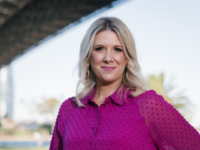In the first eight weeks after launching myBeepr achieved an uptake of 90 per cent among doctors at major hospitals in Sydney and Melbourne.
MedTech start-up myBeepr is Australia’s first highly-scalable, fully secure, smartphone-based messaging platform for clinical use. The innovation is the brainchild of Krupa Bhagani, who in 2016 was compelled to hit the pause button on a promising corporate career to care full-time for her terminally ill father.
With her sister, Kruti, living interstate, Krupa had to try and manage all her father’s various medical treatments, medications, and appointments alone. The challenge was compounded by the fact that his treatment and care were managed by different teams in different areas of practice areas in different locations, with ineffective technology leading to miscommunication between those different teams that resulted in serious glitches in his care.
Krupa and Kruti spoke very regularly and these communication issues were a recurring theme. They were shocked to hear of a case in 2018 of a Hodgkin’s lymphoma patient who was ultimately found to have died as a result of specialist scans showing lung toxicity being faxed to a wrong number.
During one of their regular conversations after this revelation, the sisters had what Kruti describes as their ‘Aha moment’. “We realised the potential for a technology application to provide a potentially straightforward solution to a massive nationwide problem,” Kruti says.
Kruti’s husband, Vikram Balakrishnan, is a practising surgeon and was able to share intimate details of his lived experience with these outdated communication tools, including his reliance on social media messaging apps, to manage patient care. And Vikram’s insights were validated by research revealing that 95 per cent of Australian doctors currently use Whatsapp, Facebook Messenger, iMessage, and other inherently insecure social messaging platforms to transmit confidential patient health information and coordinate patient care.
It became clear to Krupa, Kruti and Vikram that it wasn’t the doctors whose communication was failing, it was the systems and frameworks within which they were forced, often exacerbated by time constraints, to provide the highest levels of patient care that were expected of them.
So, Krupa turned her back on the relative the security of her corporate career for good to spearhead the founding of the solution to the problem she conceived with her sister and brother-in-law, myBeepr. The trio quickly became heavily involved in Australia’s start-up scene. They were awarded placements with both the SheStarts and HCF Catalyst accelerator programs in 2017, eventually opting for the HCF program, which brought with it seed investment of $500,000. This capital, paired with established relationships with decision makers at a selection of hospital sites, enabled them to bring their product to market rapidly. In 2021, despite the challenges of starting a new business in the midst of the global coronavirus pandemic, myBeepr was rolled out to over 2000 staff at St George Hospital in Sydney and Western Health in Melbourne.
In just the first eight weeks after launching, the team achieved an uptake of 90 per cent among doctors who used myBeepr to share than 1.5 million messages and thousands of secure clinical photos.
The sisters are in the process of securing a second round of backing by Australia’s largest medical indemnity insurer, Avant, a scenario Krupa describes as an enormous validation of their efforts to date and myBeep’s potential.
“myBeepr is fast transforming the speed, quality, and security of patient care and care collaboration in Australia,” Krupa says. “The technology we’re building, and the company’s success, promises to be our father’s lasting legacy.”
This article first appeared in issue 34 of the Inside Small Business quarterly magazine
















